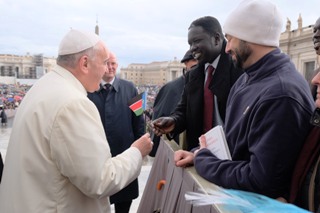Catholic bishops welcome Pope’s prayer of peace for S. Sudan, DRC
February 24, 2018 (JUBA) – The Catholic Bishops of South Sudan held a meeting between 21-23 of February and expressed gratitude to the Holy Father, Pope Francis for calling the world to pray for peace, particularly in South Sudan and the Democratic Republic of Congo (DRC).

“We are encouraged by Holy Father’s personal interest in our nation and we renew our invitation to him to visit us when the right time comes,” the Bishops said in a statement.
The clerics call for an end to the killings and stressed that it was “unacceptable” to be negotiating for positions and percentages, yet fighting continues in the country.
“We thank international and regional bodies for their commitment to revitalizing our peace process. Although we note that some of these actors may also have their own interests. We hope that Phase Three of the High-Level Revitalization Forum will end the violence,” added the statement.
However, the groups said they are dissatisfied that their leaders in both government and opposition have so far been unable to put their own interests aside and make peace for the good of the people and the nation quoted a Biblical Psalm 95:8, “Harden not your hearts”.
“We fear that our leaders do not know how to make peace. They are confused. They are military people who see the world through the lens of violence. They need help not so much with the technical and political details, but with the spiritual and moral courage to make peace, to hold a vision of the future which includes peace”.
The Church leaders said trauma can paralyse people minds and make them behave inappropriately erode their morale and morals and lead to self-pity and denial.
“They fear peace. They are finishing their own people. They have called on their followers of whichever tribe to sacrifice for some gain, but what is the gain? The leaders are afraid to return to the people without anything to show. So they continue this senseless war because they do not know what to do. To continue fighting is easier for them than to take the risk of making peace. They fear not only international justice but they fear what their own people will do to them when they fail,” it added.
The conflict in South Sudan has taken more than four years and tens of thousands of people have died with millions have been displaced.
“Looting, rape, hunger, economic collapse, the breakdown of the rule of law, destruction of the nation’s infrastructure, children denied education, families denied health care these represent failure.How many more deaths do there need to be. How many more failures, before they will admit that they have failed and that they don’t know what to do? ” the Catholic bishops asked.
In 2015, the South Sudan Council of Churches had issued similar Statement of intention of creating neutral Forums where the leaders of the government and of the main opposition parties, other armed groups and political factions could meet for dialogue in a safe space, but such initiative had neither succeed.
“We the Catholic bishops pledge our full support to this process, which should include a spiritual retreat, to be led by religious leaders from South Sudan and elsewhere. The theme of the retreat would not be political it would be a healing retreat to bring about personal transformation to prepare the participants to face the task of making peace.
The South Sudan Catholic bishops renewed calls for prayer and fasting for peace, and to continue with prayer and fasting on a regular basis in the coming months.
“We also recognize with sadness that many of our people in South Sudan are actually fasting continuously as they have no food to eat. Peace will come when the hearts of the South Sudanese leaders are changed. Let us pray for that conversion”.
(ST)
